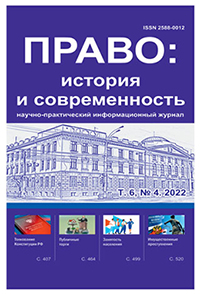Welcome to the "Law: history and modernity" website
ISSN 2588-0012
Included in the Russian Science Citation Index (RSCI)
Included in the Russian Science Citation Index (RSCI)
 |
FSBEI HE "Tambov State Technical University" |
 |
"Legal Center" FORUM" LLC |
Publisher: Publishing House FSBEI HE "TSTU"
Editor-in-chief: E.E. Orlova
Deputy Editor-in-Chief: E.V. Sudorgina
Executive Secretary of the Journal I.G. Pirozhkova
- The journal has 4 issues a year;
- Format 70 * 100/16, 10 printer'ssheets;
- Circulation 100 pcs.
1. THEORY AND HISTORY OF LAW
2. PUBLIC LAW
3. CRIMINAL LAW
4. PRIVATE LAW
5. RELEVANT PROBLEMS OF LAW

Elena Evgenievna Orlova
is the Chairlady of the Editorial Board of the journal
Director of the Law Institute of the Tambov State Technical University,
Candidate of Legal Sciences, Associate Professor.
Current issue
Articles
Development of Doctrinal Approaches to Legal Regulation in Domestic Legal Science of the 20th–21st Centuries
A. Avdeev
🗏 : 143 – 153
DOI: https://doi.org/10.17277/pravo.2025.02.pp.143-153
PDF:
The Institution of the Death Penalty in Modern Russia
P. Vetrov
🗏 : 154-165
DOI: https://doi.org/10.17277/pravo.2025.02.pp.154-165
PDF:
Protection of Labor Rights in the Soviet Period: 1930s – 1970s
A. Petrov
🗏 : 166-176
DOI: https://doi.org/10.17277/pravo.2025.02.pp.166-176
PDF:
Enforcement of the Law as a Circumstance Precluding the Criminality of an Act in Russia: History and Modernity
P. Skoblikov
🗏 : 177-200
DOI: https://doi.org/10.17277/pravo.2025.02.pp.177-200
PDF:
Corruption Factors and Risks in the Work of the State Traffic Inspection
D. Shamansky
🗏 : 201-213
DOI: https://doi.org/10.17277/pravo.2025.02.pp.201-213
PDF:
Digitalization of Criminal Proceedings: Prospects and Risks of Transformation of Evidentiary Activity
V. Gauzhaeva
🗏 : .214-222
DOI: https://doi.org/10.17277/pravo.2025.02.pp.214-222
PDF:
Using Artificial Intelligence in Forensic Science
E. Lykov, A. Belsky
🗏 : 223-230
DOI: https://doi.org/10.17277/pravo.2025.02.pp.223-230
PDF:
Some Aspects of Countering the Investigation of Corruption Crimes
A. Popov, V. Shurukhnov
🗏 : 231-237
DOI: https://doi.org/10.17277/pravo.2025.02.pp.231-237
PDF:
The Problem of Countering Crimes Committed through Deepfake Technologies
D. Tetkin, A. Pudovkin, A. Likhotkina
🗏 : 238-246
DOI: https://doi.org/10.17277/pravo.2025.02.pp.238-246
PDF:
Some Areas for Improving Legislation on Battery by a Person Subject to Administrative Punishment or Having a Criminal Record
O. Shubina
🗏 : 247-257
DOI: https://doi.org/10.17277/pravo.2025.02.pp.247-257
PDF:
Topical Issues in the Fight Against Retail Sales of Tobacco Products and Devices for Consumption of Nicotine-Containing Products to Minors
Z. Shkhagapsoev
🗏 : 258-266
DOI: https://doi.org/10.17277/pravo.2025.02.pp.258-266
PDF:
Issues of Recognition and Enforcement of Arbitration Decisions in the Investment Arbitration System
V. Gavrilenko, A. Gavkaliuk
🗏 : 267-274
DOI: https://doi.org/10.17277/pravo.2025.02.pp.267-274
PDF:
The Will of an Individual in Civil Law and its Levels in the Context of an Interdisciplinary Approach (Part 2)
I. Kalinina
🗏 : 275-285
DOI: https://doi.org/10.17277/pravo.2025.02.pp.275-285
PDF:














